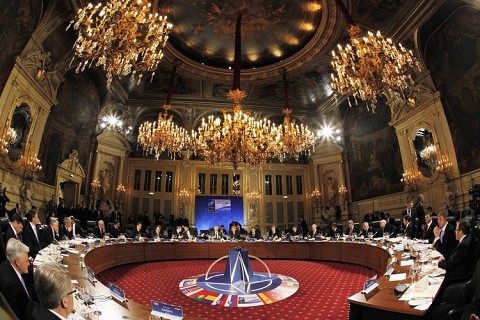As Goes the West, So Goes NATO

NATO has always been more than just a traditional military alliance because it has always been about more than just traditional military security.
When the Atlantic Alliance was established 60 years ago, its founding vision involved more than just the defence of Europe and America against the Soviet Union. It was much bigger and far more compelling than that. NATO’s original raison d’être was nothing less than the defence of Western civilization against Eastern tyranny.
If anything, the ensuing decades of the Cold War clarified and crystallized the political and intellectual division between the West and the East. And NATO evolved from its origins as a defensive alliance to become part of an offensive vanguard that sought to spread the ideals of Western civilization, such as political freedom and democratic capitalism, to other parts of the world. The issue of enlarging NATO, for example, came to epitomize the larger question of establishing the borders of Western civilization.
But somewhere along the way, the West stopped believing in the idea of Western civilization. In the United States, the spread of economic interests throughout Asia and Latin America, that is to say, outside of the boundaries of the West, made the concept of Western civilization seem too narrow. In Europe, the rise of deconstructionism and post-modern philosophy displaced the core intellectual and spiritual base of Western civilization, especially as it pertains to Christianity. And in both America and Europe, the steady growth of immigration from non-Western countries has led to the rise of multicultural ideology, which at base is hostile to the idea of Western civilization. As a result, the West is now essentially post-Western.
This post-Cold War, post-Western West is, however, in the throes of a profound identity crisis. It is adrift and unable (and seemingly unwilling) to define, much less defend its values and face up to the challenges that threaten its way of life. It is weak and divided. It is in crisis, both morally and intellectually.
The abandonment of Western civilization by its strongest defenders, combined with important shifts in the transatlantic balance of power, has contributed to a fundamental breakdown of the Euro-Atlantic security order. Europe and the United States are now incapable of agreeing upon even the most basic strategic priorities. They remain unable to define, much less engage, strategic threats. The end of the West has also had major negative consequences for NATO, because it has deprived the Atlantic Alliance of its main legitimating mission. Since the end of the Cold War, NATO has been at the mercy mainly of bureaucratic momentum, which is why it generates so little enthusiasm and political support from among European and American publics.
If NATO is to survive another 60 years, it needs more than just a new Strategic Concept. It needs to conceptualise a new legitimizing idea, a grand overarching vision that clearly and effectively confronts the grim security realities the world now faces. Still missing at this historical crossroads is the leadership that is up to the task of turning vision into reality. At transatlantic summit after transatlantic summit, European and American political leaders seem content to paper over problems instead of solving them. Historically, the West has not been given to fatalism and a good step in the right direction would be to confidently and articulately reaffirm support for the time-honoured values and principles of Western civilization. Otherwise the future of transatlantic relations in general, and NATO in particular, will remain an open question.
Soeren Kern is Senior Fellow for Transatlantic Relations at the Madrid-based Grupo de Estudios Estratégicos / Strategic Studies Group
Published in Security and Defense Discussion Paper, July 1, 2009



